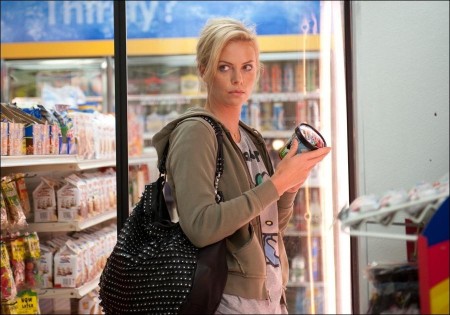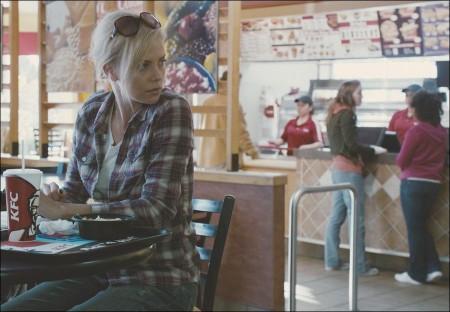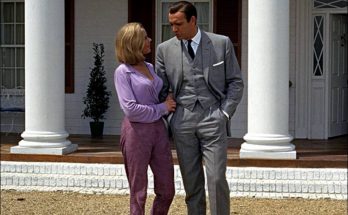The story of Young Adult both literally and fictitiously begins in Minneapolis, MN. Screenwriter Diablo Cody lived there for several years and the city has become something of a muse for her. “For some reason every time I go back to Minneapolis I find myself really inspired and I find myself with this germ of a new idea,” she says.
This one began with ‘an amazing news story’ about a woman who had gone after her high school sweetheart years later and as she explains, “I thought to myself, that’s pretty rich. What if there was this woman, this character who is kind of emotionally immature and the happiest she’s ever been in her life was high school? What if she’s still kind of stunted and thinks that the only way she can reclaim that happiness is to literally go back and find the man who made her happy then? Then I just started writing.”
Cody created Mavis from the inside out, starting with her emotional core, in a free-verse sort of approach, rather than a structured screenplay.
“I didn’t sit down with a fully fleshed story in my mind. I had the idea of somebody who is emotionally stunted and maybe peaked in high school and wonders now in her 30s how she can recreate those circumstances and be the queen bee again. Mavis was a character who sort of revealed herself to me and became more and more complicated as a person. I started to write more real scenes for her and finally the whole story came together,” Cody says.
Producer Mason Novick, a close friend of Cody, having discovered her as a blogger and worked with her ever since her first movie “Juno,” says: “I think this is a very personal script for Diablo. I think she feels characters like Mavis are underrepresented in mainstream media. Mavis is a woman who maybe doesn’t have the best plan, but it’s fun to watch her carry it out anyway.” Novick says. He adds that the movie was so unique and riveting that he was compelled to help get it made.
“When you read something that makes you say, ‘Wow, this is great! This is moving and I get these characters and their story,’ it is such a joy. It is material that has to be handled very specifically, because there are huge peaks and valleys. You go from serious to shocking to comedy to tragedy on this journey with these characters. This is a special movie,” says Novick.
Novick then brought the script to ‘Juno’ producers Russell Smith, Lianne Halfon and John Malkovich, who collectively form the production company Mr. Mudd. The team agreed that the script for ‘Young Adult’ was one of the best scripts they’d read in recent years.
“Mavis is such an unbelievable central character,” Smith says. “A character you just find yourself laughing at and then sort of open-mouthed, like, ‘uh-oh, what’s going to happen?’ And that’s always a great way to start.”
“Mavis doesn’t respond in the way you wish anybody would necessarily respond in her situation but it’s so completely well-observed that it seems utterly real and what we were blown away by is that the character is so specific and so unpredictable, very much in the way that ‘Juno’ was,” Halfon adds.
Halfon and Smith set out to assemble a singular artistic team, one that would completely understand and honor the very idiosyncratic voice of Cody’s “Young Adult.”
“Sort of like ‘Juno,’ this script was unusual. The beautiful mean girl, that’s not a big surprise in Hollywood in movies. But it’s usually the sweetheart who is in some fight with a mean girl and the mean girl is not usually the protagonist.” says Halfon. Nathan Kahane and his team at Mandate Pictures were the subsequent “Juno” alumni to join “Young Adult.” “We jumped at the opportunity because we had such a good time on ‘Juno’ together,” explains Kahane. “We felt that it was Diablo’s most mature work and yet in the overall macro of the business, distribution was running away from challenging material and this was obviously challenging material. We had a lead character who was the type of woman that historically we don’t want to see which made it both scary and fun,” says Kahane.
The group unanimously agreed that two-time Best Director Academy Award nominee Jason Reitman was the only filmmaker to helm “Young Adult.”
“I had always hoped in my heart of hearts that I would get to work with Jason Reitman again. I would do every project with Jason if I could because it’s so rare as a writer that you meet somebody who is that connected to you in terms of what you want to convey, the stories you want to tell, understanding the character on the page. We have a very magical, creative relationship. Whenever I write anything, I send it to Jason because I want to know what he thinks,” Cody says.
“We recognized that Jason understood the cadence of Diablo’s writing better than anybody,” recounts Smith. Per her practice, Cody sent a draft to Reitman who gave her some notes. She continued to refine the script and got the feeling that he liked it.
“I was nine months pregnant and Jason called me and said, ‘I want to direct this movie. I’m going to put off this other project I’m working on to direct ‘Young Adult’ in a couple months.’ So it immediately went from a project in development to oh my God, it’s happening in eight weeks. That was amazing,” Cody recalls.
Reitman says that he loves Cody’s distinctive take on stories and characters and the unconventional, bold “Young Adult” was particularly appealing.
Among other things, Cody’s script and particularly the potentially odious but very entertaining Mavis Gary appealed to Reitman. “Hopefully Mavis is a character that the audience has never seen on screen before. I think that there’s a long history of male characters that we love to hate but there’s actually very few female characters that we love to hate. It requires great writing and great acting and that’s how I think this movie is going to work because Diablo wrote a hell of a screenplay and Charlize knew exactly how to walk that tonal balance…that very fine razor’s edge of being brutal with people and yet very human and very funny,” says Reitman.
In fact, Reitman knew that only Theron could pull off a character as unlikable as Mavis Gary.
“The first time I read the script I kind of knew, if I’m going to make this movie it has to be with Charlize. I had just met her and in talking to her I realized she was really funny. I already knew what a great actress she was. I wasn’t attached to the project yet but I had read it and liked it and I thought if I was going to do it I should do it with her; my decision basically came down to her … and I ran into her in a restaurant and said ‘I really want you to play this part’ and she asked me what it was about and I said ‘it’s about this horrific human being, this passive aggressive mean bitch who just kind of spouts hate on the world around her and her journey is that she’s trying to break up the perfectly harmonious marriage of her high school sweetheart’ and I have to imagine somewhere in her heart she was saying ‘Ok, that’s what you think of when you think of me?’” jokes Reitman.
The Academy Award-winning Theron is an uncompromising actress known for taking on roles that range from tough to despicable and portraying them with an unvarnished truth, the way these people ARE rather than the way we hope they might be. Despite the pretty package, Mavis Gary is definitely a member of that particularly prickly cast of characters
“When I heard about Charlize I thought, this is perfect. I honestly could not think of anybody better for this part. I never think about actors when I write because it’s a little presumptuous – you don’t know if (the movie) is even going to be made. Any time I get casting news it’s a thrill, but it was particularly so with Charlize. You know, Mavis is in every scene of this film and it’s a heavy role and she’s incredible,” says Cody.
The Diablo Cody / Charlize Theron combination was a particularly fascinating prospect for Reitman. “If there is something Charlize is known for, it’s for going unflinchingly into ever character she does. It was exciting to work with a fearless writer and a fearless actress at the same time,” Reitman says.
He adds that Theron allows the audience to relate to if not entirely like a very unsympathetic character like Mavis. “The biggest thing that Charlize does is she takes a character that would otherwise be completely unlikable and creates a sense of empathy with the audience. In the hands of any other actor, the audience would just turn away. With Charlize, you understand why Mavis is broken and that’s honestly why I think the movie works,” Reitman says.
Theron says that if her approach to Mavis works, it was due largely to her admiration of and trust in Reitman. “The biggest lesson I’ve learned in my career is that you can have great material but if you don’t have a director who inspires you or is capable, it really doesn’t matter.
It’s important to have chemistry with a director and Jason and I could not be more similar in terms of how we approach the work. I had complete trust in him – so when he said we had a scene in two takes, I could walk away from it believing that we did. I hate fussing and rehearsal and I love just coming in and getting the job done. And that’s how he works. He has a real love for what he does and is protective of the characters and the process. For me, that’s all I can ask for,” Theron observes.
While Theron truly understood and channeled Mavis on-screen, she did not carry the character’s abject, myriad flaws with her when cameras stopped rolling. Theron was careful to not let Mavis interfere with her usual gregarious and bawdy sense of humor on set.
“When she came to set, she owned it. She entertains people. She engages people. She and the director had a really special relationship, which everybody has seen and through all that it’s just been some terrific work that’s come out of that. She’s really special,” says Russell Smith.
Next came the parts of Matt and Sandra Freehauf – Mavis’ former classmates who become entangled in her misguided quest to regain her high school sweetheart, Buddy Slade. The process began with a table read at Jason Reitman’s home in Los Angeles where it became clear that Patton Oswalt was the actor to play Matt Freehauf, who is really Mavis’ only true friend – even if she doesn’t recognize it at first.
“The chemistry between Charlize and Patton at that table read was just off the charts. And it confirmed an idea that I had begun to feel when I read the script which was this is a romance about a couple that would never be. There was something heartbreaking about that. To watch the way they riffed off of each other. I remember telling them early on that there are a lot of couples who signify their love for each other by noting that they love the same things. With these two, their bond is that they hate the same things. And that’s what brings them together,” Reitman says.
“Patton was amazing,” recalls Halfon. “It was like the film distilled for us right there at that table read. It helped identify the relationships and the characters and story axis on which the film is built. Sometimes you see these things in the screenplay really clearly. It was a surprise to me, this kind of connection between the characters of Matt and Mavis, because it was much clearer to me in the room than it was to me on the page.”
Cody had worked with Oswalt on her Showtime series The United States of Tara and was elated when she heard the news. “I’m a huge fan of his. He was the kind of person that I would imagine to play the part of Matt and I never suggested it to Jason because I try to stay out of that. It’s Jason’s job and so when he said I talked to Patton Oswalt about this I said, ‘Yup, that’s exactly who I would have picked’ so that was nice.” says Cody.
Cody calls Matt Freehauf “the heart of the movie,” due largely to Oswalt’s portrayal of him. “Patton is incredible. When Mavis walks into that bar and Matt is sitting there, suddenly there is a warmth to the story. Up until that point, it’s almost been this howling frozen wasteland. When she meets him, you realize this is a good person, an authentic person, someone with a big heart, someone we want to know. He is the one person who will stand up to her. He serves as her conscience. He likes Mavis and he makes us like her a little bit too. And that is really because of Patton’s performance,” Cody says.
Reitman definitely had Oswalt on his radar, even before the table reading. On a road trip, he entertained himself by listening to Oswalt’s stand-up comedy, which is peppered with idiosyncratic rants and observations, and the two began corresponding.
Oswalt was also a fan of Jason Reitman films and happily accepted the offer. As he tells it, “Implying that I chose this role implies that I’m at that point in my career. Jason Reitman offered me the part and I took it. I really like his movies and he said ‘Do you want to do my movie?’ and I went ‘Hell yeah!’ so this wasn’t a choice. This was me lucking out,” Oswalt says.
Many aspects of Freehauf appealed to Oswalt, from his honesty to his foibles. “He was a very attractive role to me just because he’s so well-written. He’s not just the ‘victim template;’ there are so many more interesting shadings to him. He’s resentful and cynical but also he’s actively trying to be kind of positive in his own dark way about his life, which I liked. It felt very realistic to me.”
Freehauf’s brutally candid, love-hate friendship with Mavis and the characters’ mutual mordant view of the world appealed to Oswalt. “I like that he really does have Mavis’ number as a person but he has to be careful in how he reveals that to her because he doesn’t want to lose her as a friend. You see him grow in courage in terms of their relationship as the situation becomes more and more ridiculous, which is fun to play. I also think he loves Mavis but he’s not sure if he likes her very much, which I think is a common situation.
It’s a hard thing to reconcile when your heart clinches up around someone who, really, doesn’t have a single attribute that you respect or enjoy. What’s interesting about Mavis and Matt is that weirdly enough, even though they are completely at different ends of the spectrum as far as physicality and sort of where they are in the animal kingdom status of things, especially in high school, they both purely and equally and lethally disdain and reject the exact same things.” Oswalt explains.
Oswalt notes that from Freehauf’s point of view, “Young Adult” is a love story but, “in a weird way, it’s also a horror movie in that Charlize is kind of this maniac stomping through the quiet countryside leaving this trail of destruction behind her. And it’s fascinating to watch that. What Charlize does in the movie that is so amazing is that she looks like herself playing this really unlikable person. When other actors play despicable characters, they make their hair darker or change something. Charlize looks like herself, there is no artifice and it’s almost more emotionally raw that way. She is channeling Mavis through her without judgment and it’s astonishing.”
Theron developed a “real deep affection” for Oswalt and felt like she had a real and satisfying collaboration with him and Reitman. “I think acting is always a very intimate experience and there are very, very rare occasions where your work with another actor surpasses what is really expected from you. I felt really safe working with Patton, like he always had my back.
I really loved working with him, his attitude, what he brought to his character. Matt and I had about seven pages of dialogue together and a lot of it took place in a bar. We were in that bar for like a week and it was really nice to play and ad-lib and discover with him. Between him and Jason, I felt like I had these two brothers who were really cool and really funny,” Theron says.
Collette Wolfe plays Matt Freehauf’s sister Sandra, who idolizes Mavis and can barely believe that this goddess from high school has returned and deigns to spend time with her brother. Ultimately, Sandra’s plain spoken advice – born out of a strikingly similar antipathy towards the narrow-mindedness of their small town – sets Mavis on a path towards the future. Wolfe and Oswalt had worked together previously so it was a nice next step to play his sister, especially since their characters in “Young Adult” were polar opposites of their previous roles together.
“I knew Patton because we had worked together on (the movie) ‘Observe and Report.’ He was my boss and I was handicapped. So, now it’s kind of ironic that in this movie, he is disabled and I’m just kind of mean to him. I love Patton. He’s hilarious and at the table read and throughout production, I was just blown away by him,” Wolfe says.
At that table read, Wolfe initially played numerous peripheral parts in the film but Reitman was so impressed with her that he gave her the small but vital role of Sandra Freehauf. The actress was thrilled at the chance to work with Reitman and the story spoke to her on many levels.
“What I loved about the script was that I feel like anybody could relate to it. For me personally, I think that everybody who has been to high school had a Mavis Gary that they went to school with and they also probably knew a Sandra that they went to school with. Sandra is an unhappy person but I don’t think she expects to be happy so when Mavis walks into her life again, she represents everything that Sandra could possibly want in life.
What is so interesting to me about Sandra is that she’s not a nice person, even though she might seem like one. In some movies, it’s clear and very demarcated who the good guy and the bad guy is and in this movie, with Sandra, it’s like ‘oh, we can identify with her because she has this sad life’ but I feel like she’s rotten to the core. The only thing separating her from being Mavis Gary is the fact that she’s not that hot and she’s not that smart and she’s not good with people. And that’s fun to play,” Wolfe says.
Theron adds that she was “blown away” by Wolfe’s performance during the pivotal conversation between Sandra and Mavis, where we find out that the two are more similar than it might seem.
“Sandra is the character who causes the most damage in a way and she does it so innocently. Collette played her so beautifully and when we did the big scene in which she tells me everything, I was completely speechless,” Theron recalls.
If Patrick Wilson and Elizabeth Reaser, who play Buddy and Beth Slade, seem comfortable together as an on-screen couple, it is because it is not the first time they have been paired together.
“I’ve worked with Elizabeth more than any other actress,” notes Patrick Wilson. “We did a play together, probably 12, 13 years ago. We have played some form of a couple many times – she’s been my ex-girlfriend, girlfriend, and now wife. Maybe next time we’ll divorce or something.”
Reaser found their marriage in this film equally as amusing. “…now we’re finally married after all these years which seems right. I’ve known him forever so it felt very natural. As soon as I saw him, I felt like we’re just this old married couple now,” Reaser says.
Wilson says the appeal of Buddy was his apparent ingenuous decency and uncomplicated affability, which may or may not mask some deeper, complicit motive.
“Buddy and Beth have a good marriage, they get along well and they’re not overly complicated. There’s a simplicity to Buddy – I found it in the details – he says things like ‘wow’ or ‘cool,’ responses that are literally just one word when he doesn’t know what else to say. But even the most simple person has so much going on. High school was a good time for him, so when Mavis comes back and reminds him of those positive memories, it’s probably nice to be looked at as a hot guy, not just as a suburban dad. She’s an attractive woman, there’s a connection. How far that connection goes, at least for a while, is up for debate,” Wilson says.
“Beth is a very compassionate woman,” says Cody. “And she encourages Buddy to reach out to Mavis and include her in their activities while she’s in town because Beth sees Mavis for what she is – an incredibly lonely person. Mavis does not want to be pitied by this woman. Mavis feels that Beth should be the object of pity and not vice versa.”
Elizabeth Reaser agrees. “I think Beth is far from intimidated or jealous of Mavis, and she sees that something is not quite right. There’s something off about Mavis and something sort of desperate in her energy,” Reaser explains.
“If women don’t love Beth at the end of this movie, we will have failed,” opines Nathan Kahane. “Beth is happy with her life because she has realistic expectations about what life is about. She is grounded in a way that Mavis will never be.”
Although they were on opposite ends of the spectrum as characters, off camera, Reaser looked forward to her scenes with Theron. “Charlize is incredible. I was completely blown away by her. She was really funny and kind of scary towards my character and those scenes were great to play. She’s an amazing actress,” Reaser says.
Veteran actors Jill Eikenberry and Richard Bekins round out the cast as Mavis’ loving yet detached parents, Hedda and David Gary, who can’t seem to face the truth about their daughter.
“There’s an enormous amount of denial that their daughter has gone over the edge,” says Eikenberry. I think that Mavis’ outlandish statements and stances start out as a sort of rebellion, like, ‘You think everything’s fine? Well let me show you this!’ but it’s gotten out of control.”
While guiding these two seasoned actors, Bekins remembers Jason Reitman providing a particualrly illuminationg picture of Mavis. As Bekins explains, he had spent a lot of time trying to determine what kind of a person David Gary had to be to cause their daugher to operate in such a manner. “I kept thinking…what must a father be like to have a daughter like this? And then Jason said ‘you know some people just turn out the way they are no matter what. I mean sometimes children are just the way they are.’”
Visits: 115




